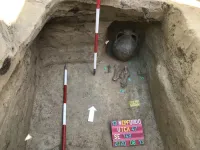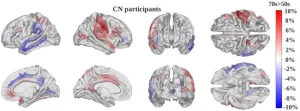(Press-News.org) Survey Finds Many Americans Greatly Overestimate Primary Care Spending
Background and Goal: This study, based on an online survey of 1,135 adults demographically representative of the U.S. population, aimed to measure public perceptions of primary care spending.
Key Insights: Respondents believed that 51.8% of overall health care spending goes to primary care—more than 10 times the documented share of 4.7%. Additionally, respondents believed that primary care addresses 58.7% of health care needs, very close to actual primary care utilization as a percentage of all ambulatory physician visits in the United States (50.3%).
Why It Matters: Chronic underinvestment in primary care has resulted in workforce shortages, physician burnout, reduced access, and suboptimal care. Access to high-quality primary care has been associated with better population health and more equitable outcomes.
The General Public Vastly Overestimates Primary Care Spending in the United States
Melissa Ma, BS, et al
School of Medicine, University of California, San Francisco, San Francisco, California
END
Survey finds many Americans greatly overestimate primary care spending
The general public vastly overestimates primary care spending in the united states
2025-02-24
ELSE PRESS RELEASES FROM THIS DATE:
Researchers advance RNA medical discovery decades ahead of schedule
2025-02-24
Ribonucleic acid, commonly known as RNA, is involved in many biological functions, and some, including gene silencing, are utilitized to cure diseases. RNA has recently gained attention as a promising drug target. Unfortunately, only a small fraction of RNA structures have been determined experimentally, and the process of uncovering these structures requires significant time and effort. Using this time scale, the structures of many life saving RNA may not be discovered for years. As a result, there is a significant gap between the types of known ...
Immune ‘fingerprints’ aid diagnosis of complex diseases in Stanford Medicine study
2025-02-24
Your immune system harbors a lifetime’s worth of information about threats it’s encountered — a biological Rolodex of baddies. Often the perpetrators are viruses and bacteria you’ve conquered; others are undercover agents like vaccines given to trigger protective immune responses or even red herrings in the form of healthy tissue caught in immunological crossfire.
Now researchers at Stanford Medicine have devised a way to mine this rich internal database to diagnose diseases as diverse as diabetes COVID-19 responses to influenza vaccines. Although they envision the approach as a way to screen for multiple diseases ...
Ancient beaches testify to long-ago ocean on Mars
2025-02-24
A Chinese rover that landed on Mars in 2021 detected evidence of underground beach deposits in an area thought to have once been the site of an ancient sea, providing further evidence that the planet long ago had a large ocean.
The now-inactive rover, called Zhurong, operated for a year, between May 2021 and May 2022. It traveled 1.9 kilometers (1.2 miles) roughly perpendicular to escarpments thought to be an ancient shoreline from a time — 4 billion years ago — when Mars had a thicker atmosphere and a warmer climate. Along its path, the rover used ground penetrating radar (GPR) to probe up to 80 meters (260 feet) beneath the surface. This ...
Gulf of Mars: Rover finds evidence of ‘vacation-style’ beaches on Mars
2025-02-24
UNIVERSITY PARK, Pa. — Mars may have once been home to sun-soaked, sandy beaches with gentle, lapping waves according to a new study published today (Feb. 24) in the Proceedings of the National Academy of Sciences (PNAS).
An international team of scientists, including Penn State researchers, used data from the Zhurong Mars rover to identify hidden layers of rock under the planet’s surface that strongly suggest the presence of an ancient northern ocean. The new research offers the clearest evidence yet that the planet ...
MSU researchers use open-access data to study climate change effects in 24,000 US lakes
2025-02-24
Feb. 24, 2025
MSU has a satellite uplink/LTN TV studio and Comrex line for radio interviews upon request.
Contact: Emilie Lorditch: 517-355-4082, lorditch@msu.edu
Images
MSU researchers use open-access data to study climate change effects in 24,000 US lakes
EAST LANSING, Mich. – Each summer, more and more lake beaches are forced to close due to toxic algae blooms. While climate change is often blamed, new research suggests a more complex story: climate interacts with human activities like agriculture and urban runoff, which funnel excess ...
More than meets the eye: An adrenal gland tumor is more complex than previously thought
2025-02-24
Fukuoka, Japan - Kyushu University researchers have uncovered a surprising layer of complexity in aldosterone-producing adenomas (APAs)—adrenal gland tumors that drive high blood pressure. Using cutting-edge analysis techniques, they discovered that these tumors harbor at least four distinct cell types, including ones that produce cortisol, the body’s main stress hormone. Published in the week beginning 24 February in PNAS, their findings not only explain why some patients with APAs develop unexpected health issues, like weakened bones, but also pave the way toward new treatment strategies.
“Currently, the only ...
Origin and diversity of Hun Empire populations
2025-02-24
The Huns suddenly appeared in Europe in the 370s, establishing one of the most influential although short-lived empires in Europe. Scholars have long debated whether the Huns were descended from the Xiongnu. In fact, the Xiongnu Empire dissolved around 100 CE, leaving a 300-year gap before the Huns appeared in Europe. Can DNA lineages that bridge these three centuries be found?
To address this question, researchers analyzed the DNA of 370 individuals that lived in historical periods spanning around 800 years, from 2nd century BCE to 6th century CE, encompassing sites in the Mongolian steppe, Central Asia, and the Carpathian Basin of Central Europe. ...
New AI model measures how fast the brain ages
2025-02-24
A new artificial intelligence model measures how fast a patient’s brain is aging and could be a powerful new tool for understanding, preventing and treating cognitive decline and dementia, according to USC researchers.
The first-of-its-kind tool can non-invasively track the pace of brain changes by analyzing magnetic resonance imaging (MRI) scans. Faster brain aging closely correlates with a higher risk of cognitive impairment, said Andrei Irimia, associate professor of gerontology, biomedical engineering, quantitative ...
This new treatment can adjust to Parkinson's symptoms in real time
2025-02-24
Starting today, people with Parkinson’s disease will have a new treatment option, thanks to U.S. Food and Drug Administration approval of groundbreaking new technology.
The therapy, known as adaptive deep brain stimulation, or aDBS, uses an implanted device that continuously monitors the brain for signs that Parkinson’s symptoms are developing. When it detects specific patterns of brain activity, it delivers precisely calibrated electric pulses to keep symptoms at bay.
The FDA approval covers two treatment algorithms that run on a device made by Medtronic, a medical device company. Both work by monitoring the same part of the brain, called the subthalamic nucleus. ...
Bigger animals get more cancer, defying decades-old belief
2025-02-24
Elephants, giraffes, pythons and other large species have higher cancer rates than smaller ones like mice, bats, and frogs, a new study has shown, overturning a 45-year-old belief about cancer in the animal kingdom.
The research, conducted by researchers from the University of Reading, University College London and The Johns Hopkins University School of Medicine, examined cancer data from 263 species across four major animal groups - amphibians, birds, mammals and reptiles. The findings challenge "Peto's paradox," a longstanding idea based on observations from 1977 that suggested ...
LAST 30 PRESS RELEASES:
Scientists discover “bacterial constipation,” a new disease caused by gut-drying bacteria
DGIST identifies “magic blueprint” for converting carbon dioxide into resources through atom-level catalyst design
COVID-19 vaccination during pregnancy may help prevent preeclampsia
Menopausal hormone therapy not linked to increased risk of death
Chronic shortage of family doctors in England, reveals BMJ analysis
Booster jabs reduce the risks of COVID-19 deaths, study finds
Screening increases survival rate for stage IV breast cancer by 60%
ACC announces inaugural fellow for the Thad and Gerry Waites Rural Cardiovascular Research Fellowship
University of Oklahoma researchers develop durable hybrid materials for faster radiation detection
Medicaid disenrollment spikes at age 19, study finds
Turning agricultural waste into advanced materials: Review highlights how torrefaction could power a sustainable carbon future
New study warns emerging pollutants in livestock and aquaculture waste may threaten ecosystems and public health
Integrated rice–aquatic farming systems may hold the key to smarter nitrogen use and lower agricultural emissions
Hope for global banana farming in genetic discovery
Mirror image pheromones help beetles swipe right
Prenatal lead exposure related to worse cognitive function in adults
Research alert: Understanding substance use across the full spectrum of sexual identity
Pekingese, Shih Tzu and Staffordshire Bull Terrier among twelve dog breeds at risk of serious breathing condition
Selected dog breeds with most breathing trouble identified in new study
Interplay of class and gender may influence social judgments differently between cultures
Pollen counts can be predicted by machine learning models using meteorological data with more than 80% accuracy even a week ahead, for both grass and birch tree pollen, which could be key in effective
Rewriting our understanding of early hominin dispersal to Eurasia
Rising simultaneous wildfire risk compromises international firefighting efforts
Honey bee "dance floors" can be accurately located with a new method, mapping where in the hive forager bees perform waggle dances to signal the location of pollen and nectar for their nestmates
Exercise and nutritional drinks can reduce the need for care in dementia
Michelson Medical Research Foundation awards $750,000 to rising immunology leaders
SfN announces Early Career Policy Ambassadors Class of 2026
Spiritual practices strongly associated with reduced risk for hazardous alcohol and drug use
Novel vaccine protects against C. diff disease and recurrence
An “electrical” circadian clock balances growth between shoots and roots
[Press-News.org] Survey finds many Americans greatly overestimate primary care spendingThe general public vastly overestimates primary care spending in the united states



